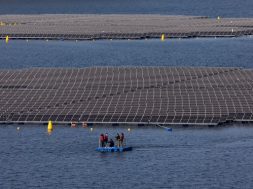
Global Water and Climate Action Day at COP23
On Friday, November 10, COP23 is holding Global Water Action Day, established within the Global Climate Action Agenda.
Water and climate go hand-in-hand. Water resources bear the full brunt of the effects of climate change.
Water and climate are inseparable
Proof that water lies at the heart of the numerous challenges posed by climate change, 93% of Intended Nationally Determined Contributions (INDCs, later NDCs) submitted by States during COP21 identified water as the key to adaptation to climate change – particularly highlighting four areas: risk management; water and agriculture; integrated water resources management; and water, sanitation and hygiene.
If water runs out or is of poor quality, unfit for consumption or for other use (irrigation, etc.), it is all of human health, fisheries and agriculture, food security, biodiversity, energy production, industrial activity, river and maritime navigation, tourism, and more. In short, every aspect of development – economic, social and environmental – that are risk. The stakes are so high that the theme of water has never stopped growing, COP after COP. After COP22 in Marrakech, this is now the second time that a COP has dedicated a whole day to the theme of water.
Blue gold, a capital that is unevenly distributed in Africa
In Africa, many regions suffer from critical water stress – as evidenced by the terrible drought in East Africa in 2017, causing hundreds of thousands of displaced persons and worsening food insecurity. Other countries on the African continent also live under the threat of water scarcity. These include Morocco, Algeria, Tunisia, Egypt and Libya in North Africa, as well as South Africa and many West African countries.
And yet, Africa is rich in water resources, estimated at 4 billion cubic metres, or about 9% of world freshwater resources. But it is also the second driest continent in the world. Most of all, these resources are unevenly distributed: the six countries with the richest water resources, in West and Central Africa hold 54% of the entire water resources of the continent, while the 27 countries with the poorest water resources have only 7%.
320 million African without safe drinking water
In other words, there is a crucial and urgent need to develop climate change adaptation projects in the continent’s water sector. Except that it is there that the funding challenge arises: how can climate funds dedicated to the sector be mobilized at a time when Africa struggles, in general terms, to obtain funds for climate change adaptation?
This issue was at the heart of a high level dialogue on improving the water and climate funding, the high point of this Day, organized by Global Alliances for Water and Climate created at COP22 in Marrakech.
Among the 27 participants in this dialogue from all over the world and representing different stakeholders (Ministers, leaders or representatives of financial institutions or organizations, etc.), Osward Chanda, Director of the Department of Water and Sanitation at the African Development Bank (AfDB), was one of the first to take the floor, keen to present the challenges through the prism of Africa and the Bank’s expertise, saying “It is difficult to find bankable, well-thought-out projects that can be finalized on time.” Chanda went on to say, “Who plans these projects?” Most often, it is the institutions themselves, mostly relying on consultants recruited for the occasion.”
Helping to build “bankable” projects: the African Development Bank prism
In addition to the difficulty of mobilizing funding for water adaptation projects in Africa, there is that of obtaining projects that are sufficiently well-prepared to qualify for such financing. Chanda explained that for this reason AfDB decided to focus on the incubation and preparation of projects: It provides upstream support to those developing African projects, offering financial help and expertise, to help them to formulate projects in such a way that they appear as “bankable” to funding entities. The Director of Water and Sanitation at the Bank also made a call to seize the window offered by nationally determined contributions to develop projects in the water sector. This was all the more so since climate funding for adaptation, already very rare compared to finance for mitigation, seemed to be standing still, as was sorrowfully noted by Rémi Rioux, Director of the French Agency for Development (AFD), tasked with introducing this dialogue.
“Water is life!” said Burkina Faso’s Minister of Water and Sanitation, Niouga Ambroise Ouedraogo. Burkina Faso has enshrined the right of access to potable water and sanitation in its Constitution.
Water forms part of two of the great themes of the COP23 roadmap as set out by the Government of Fiji, which is chairing the Summit this year: theme 3, which calls for “strengthening the resilience of the most vulnerable countries to extreme events and the rise in sea levels, for promoting access to climate funding, for renewable energy, for water and for sustainable agriculture”; and theme 6, which is to “develop an holistic approach to the protection of our planet, particularly by establishing a strong link between the good health of the oceans and the fight against climate change.”
















